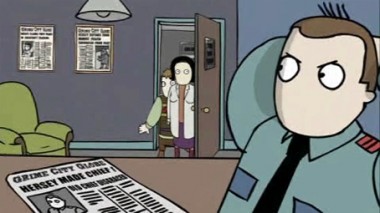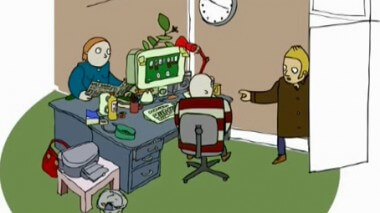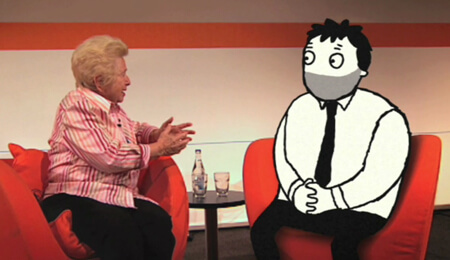A Conversation with Sam Morrison
Sam Morrison has been an active presence in the UK animation scene since 1997, when he graduated from the RCA with his cutout student short “Balls”. In the years since he has continued to write and direct for companies including Aardman and Nexus, on all manner of projects spanning children’s television to sexual awareness campaigns, as well as his own short film work. In recent years he has most notably directed and animated the shorts “Rocket Science” and “Grime City PD”, which chronicle the investigative prowess of the casually misogynistic flatfoot Jack Hersey. Sam’s latest short “Greetings” is a wittily executed second outing for the atypically philosophical Henry of “Balls”. This time around working as a designer for a greetings card company, Henry finds his efforts to inject his own passively bleak life view into his work stymied by an inimical boss and his own lethargy. Skwigly recently met with Sam at his studio in Bristol to discuss his work and approach to independent animated filmmaking.
What was it like producing your first film at the RCA?
The first film being “Balls”, my graduation film? Well I’m not the most visual of directors in terms of flair and technique, my films really tend to be quite straightforward cartoons. Back then I was even more scissors’n’sellotape in my approach, but Michael Rosen – who, luckily enough, had come in to do tutorials – read the script out loud and it just struck me on the spot that his voice was a really nice counterbalance to how I knew the film was gonna look. The animation is fairly shonky, and him talking really beautifully over the top went really well with it. I sort of used him to save me a little bit.
How did you find it forming a career after graduating from the RCA?
I was really lucky in that I had two things happen quite quickly. One was then called the MOMI (Museum of Moving Image) scheme, I think it was called the AIR scheme later and now I’m not sure if it even runs at all. You become a living exhibit in the South Bank Museum in London for three months, and during that time you’re making a film, or a trailer for a film, or parts of the film you’re trying to get commissioned. So I got on to that quite quickly from an idea my mum gave me, of all people! And then I also got representation through Nexus Productions in London, not so much to do with what I did visually but more about my writing, because Nexus are more about overall talent than animation per se. They were – and, I assume, still are – into broadcast, so they were interested in my ideas about animated series, rather than me particularly as an animation director for commercials. So those two things happened quite quickly for me, and then the first job I did for Nexus won a British Animation Award. I’d had a lot of freedom on it, which I subsequently found out wasn’t normal, so I was naively thinking “This is it, I’ll just carry on getting these jobs. I’ve got the representation, I’m making films, I’m winning awards, I’ve made it!” Obviously not realising it was just one peak in the first of many peaks – and troughs.
Do you feel that having such a unique signature style as yours is an important thing to hold onto, especially if you’re directing your own story ideas?
Yeah, it’s important but it can sort of hobble you a little bit as well. I dunno, maybe it’s disingenuous to say that because I’ve always wanted to make a series rather than commercials in an ideal world. I do like making commercials, I wouldn’t dismiss that, but because I’ve always been more focused on story I’ve tended to stick with that quite simple style. Maybe I should’ve developed it, maybe I should’ve put noses on! But in terms of generating commercial work, maybe it’s better to be more adaptable? I know directors who can do lots of different styles and I envy them that, I think it’s really good. That’s the downside to a ‘signature style’, I guess…I don’t know what the upside is!
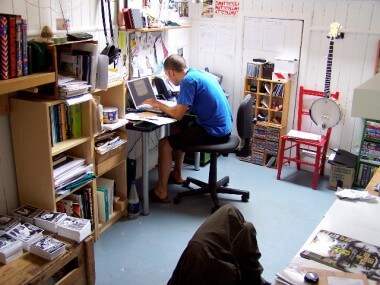 Do you find that it goes well with the software and digital processes you now use?
Do you find that it goes well with the software and digital processes you now use?
Yeah, though when I started out as an RCA graduate there was one person doing their film on computer and the rest of us were still shooting on 16mm Rostrum cameras, saying “Oh, computers, how novel!” So when I first started animating ‘professionally’ I was drawing on paper. As a slight technophobe it’s been sort of hard for me to adapt to using computers, I’ve gotten to know ToonBoom and that’s what I tend to use. I’d love to be a real dab-hand at After Effects and Maya and countless other things, it’s not that I get fearful when I look at a computer screen, it’s more that I’ve been much more interested in story, so I’ve prioritised that.
Do you feel that over the course of your career there has been a comfortable balance of commercial work and personal projects?
Depends on what day of the week you ask that question, I guess (laughs). It’s less comfortable when you’re waiting to hear on stuff. I’ve been developing a series with Aardman; I’m waiting to hear back on something from Warp Films; a co-writer and I have written a sitcom and there’s a production company in London interested in it – these are all many things that could be great, or could possibly amount to nothing, so in a sense right now it would be great to be doing a commercial! I think my ideal would be to making commercials frequently, but still with the freedom to write and develop things.
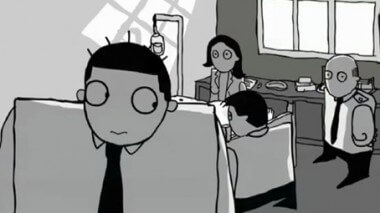
Jack Hersey’s first outing in “Rocket Science” (2007)
Having worked with co-writers semi-frequently, do you find that working with a writing partner makes the process easier, as someone to bounce ideas off?
Yeah, definitely, just in terms of motivating yourself. I can write quite fast, but because I know that I can find it very easy to rest on my laurels and put off starting. But if you’ve got somebody waiting to have a look at your draft or somebody coming in to sit and write with then obviously you can’t do that. I met Andrew (Endersby, co-writer) at college where we both did the same degree, he co-wrote “Rocket Science” and we’re writing a sitcom together now. We’d written about four scripts based on Jack Hersey, initially we were writing it so that every new episode would be ten years later in the character’s life, so we could sort of parody these different genres that cropped up in different decades over time, but just in terms of a serial it’d never get off the ground, ‘cause obviously after six episodes he’d be dead! There’s these old scripts that wouldn’t have gone anywhere in terms of getting a commission, so I wrote this other one which turned into “Grime City”. I co-write with another guy called Danny Stack as well, he does the Scriptwriting In The UK blog, it’s really worth looking at if you’re interested in scriptwriting. We wrote a feature together about ten years ago, which has gone through its own life of peaks and troughs and near-misses.
Would it be an animated feature?
Yeah, CGI though. So as a starting-out project it was a tricky combination of fledgling writers and expensive budget. I’m not a big ideas man. Danny is always coming up with new stuff, and I sort of envy that turnover, it’s just incredible. I tend to revisit things that I think are worth looking at again.
In that respect the virtue of a series is having characters that you’re familiar enough with, that aren’t one-trick and have potential to go on different types of adventures and have a lifespan.
Oh yeah, absolutely, I mean one regret with “Grime City” was, having had all this nice feedback from “Rocket Science”, there were two main issues from a commissioning point of view, the first being that it was set in the US and it wasn’t topical. Those were easily fixable, and fixing them kind of improved it, setting it in the modern day but with really old-school parochial values. The other one was that it was black and white, so it was supposed to be “Okay, I’m gonna make another pilot based on this feedback” and so various people would say “Don’t bother, you’ve had enough of a ‘no’ to not turn it into a ‘yes’”. Which has proved to be true – so far – but I wanted to do it anyway and what I regret is not somehow doing the twenty-five minute version – which was its length as-written – because the gag count was so much higher. In chopping it down to eleven minutes I didn’t want to sacrifice all these elements of the story, so I ended up cutting gags instead. Certainly the last quarter of the film feels like we’re getting through the story too quickly, which is a bit of a shame. But logistically I don’t know how I would’ve made a twenty-five minute animation with five grand.
You mentioned the tone is more informed by American pop-culture, sort of a Film Noir-meets-80s Cop Drama type vibe…
Definitely, I mean Andrew and I are still into B-movies. I always hated describing it as a B-movie spoof because obviously those have been done to death, so it’s more of a homage than a spoof. We loved the fact that, because the budgets were small there were hardly any effects and you’d get this very expositional dialogue, which is what you’re supposed to avoid, allegedly. So yeah, definitely informed by those types of movies, and some of those movies are brilliant as well, “Invasion of the Body Snatchers”, “Terror in the Year 5000”, “The Incredible Shrinking Man” and stuff like that, they’re awesome films! With “Rocket Science” and “Grime City” it was supposed to be political with-a-small-‘p’ about – this sounds so ancient now – George Bush bombing Iraq and just how if you assume someone’s an enemy from the outset, then of course that’s what they’ll become. So in the original draft of “Rocket Science” the aliens were actually aggressive, but then it seemed it would be much more relevant if they weren’t, to have it be not as clear-cut as Jack makes it. Basically Jack decides what the story will be rather than the facts.
Once you’ve finished a film, what’s your process for getting it out in the world and in front of audiences?
When I was with Nexus they had optioned “Rocket Science” and they had somebody devoting time to sending it out to festivals, taking that financial hit. “Greetings” I didn’t do any promotion really for a few months, with “Grime City” I did a screening in Bristol and a screening in London and showed it to a few people but didn’t really have the money or the time to send it to every festival, so I’m not the poster boy for self-promotion, unfortunately. But “Rocket Science” went round lots of different places.

Jack Hersey
From my perspective it does seem that, from what you’ve said about the Jack Hersey films along with his online presence on Facebook and Twitter and so on, those seem to be the films that have gotten more circulation. Do you think there’s a quality to the character or scenarios that resonates more with people?
It’s partly because I’ve pushed them more, like with the initial big push with “Rocket Science” on Nexus’s part. But yeah, I find Jack is a great character to write for, although I think he’s sort of appalling! I had a project meeting with a producer from Nexus and a producer from Sony who were both women and at some point during the conversation they were both saying “You have to admit, Jack is very attractive”! (Laughs) I was like “Is he?”, thinking I’m doing something wrong here, being a pathetic liberal. They talked about his dynamism, his magnetism and stuff like that. He obviously does have those qualities, but he’s also a total shit.
Going back to your point about approaching short films as pilots, are there any of your films in particular you’d like to see developed into a series?
“Rocket Science” nearly was, although it’s not anymore. I’d love to develop “Greetings”, no-one’s backing me with any hard cash as of yet but Michael Rosen’s really keen on doing more and being involved in the writing and stuff like that. So yeah, I’d love to, but what I’ve found with both “Grime City” and “Greetings” is you don’t know whether people are always being straightforward or possibly sugaring the pill; I had Channel 4 saying they were “too sophisticated” for the audience, which may have just been a nice way of saying the gag rate is too low.
You’ve done writing work for “Peppa Pig” and other children’s TV, do you find that writing for adults and kids are different disciplines? Does one come off more easily than the other?
I probably couldn’t say definitively because all the “Peppa Pig”s and “Little Kingdom”s were co-written with Mark and Neville, the creators. I mean, I’d do the act of writing, of going away and putting stuff together, but they’re very heavily involved and know what they want, in a good way. I like to write for all ages, I’d really like to do more with those guys if they make more series, I really enjoy doing that stuff, they’re fun to work with and they’re fun scripts to do. But the sort of writing I’m doing with Andrew in particular is sort of ‘adult’ comedy, not in the sense that there’s nudity and swearing but it’s aimed at adults. I don’t know if I’d say one’s easier than the other…
Having worked on projects aimed toward younger audiences, I find there’s always this fear about keeping certain subject matter restrained while at the same time not being condescending.
I guess with “Peppa” being an existing property as a show, you know the tone it strikes, which isn’t patronising in any way. As you’ve sort of intimated there, I think kids’ viewing habits are always quite aspirational. If something’s pitched toward ten-to-twelve year olds, then you know kids younger than that will want to watch it. My little boy’s three, for example, and he goes on about “Ben 10” all the time – he’s never seen it, he just knows other kids talk about it. I think the key with “Peppa” is that some of the humour is fairly adult, but not in a cynical way, it’s not a “Look what we snuck in there, aren’t we clever?” sort of thing, it just makes it nicer for parents to sit and watch with their kids, I guess.
Your latest film “Greetings” shares a fundamental connection to your student film “Balls” with the atypically philosophical character Henry. Why did you go back to that character and narration style after such a long time?
Early midlife crisis, maybe? There’s a lot of me in Henry, I’d like to think I’m not him but there’s probably too much of me in there. Like I mentioned earlier, I’m not a big ideas guy, so if I get something I like I’ll return to it, even ten years later. I thought that the character might still have value and I contacted Michael Rosen who was really into doing it again. I guess the short, honest answer is I hang onto things when I really like them, that’s why I’ve ended up doing two Jack Hersey films and two Henry films.
Do you consider “Greetings” a sequel to “Balls”, or a companion piece of sorts?
I guess it’s a sequel, it’s the same character, in the same way it explores how I spend too much time in my own head and sort of internalise everything. It’s a really self-indulgent, non-productive quality and so I’ve taken that and made a character who does it even more than me! But for Henry he’s sort of just going round and round and round and when he’s in his head it’s almost like an escape because it goes fullscreen.
I do quite like that motif, the rotating stage visual. Was that a theatre reference or just a metaphor for his headspace?
Well yeah, it was supposed to be this thematic thing of him just going round in circles, the daily grind of going to work, going home and not having anything else really going on in his life, and so the headspace becomes the dominant thing. But also I liked animating it – at least when I started doing it; when I was getting to the later ones it was a bit like “Why the hell did I do this?” (Laughs)
Are there any new filmmakers or new things happening in animation, films, commercials that you find especially inspiring or progressive nowadays?
I really like going to the cinema, and I like going to festivals for a because good films are inspiring – and crap films are equally inspiring because you think “I could do better than that!” I’m not so immersed in the world of animation, but as for what inspires me…I’ve been watching “The Good Wife”, that’s great. I’ve been rewatching “Peep Show” which is awesome. Having seen quite a few big Hollywood animated movies that didn’t really do a lot for me, in quick succession I saw “Up” and “Cloudy With A Chance of Meatballs” and for quite different reasons I really liked them, I found them really inspiring, though it’s hard to relate them to what I do in this studio.
How did you come to work on an animated project with Dr. Ruth?
(Laughs) She was great, really good fun. We did this thing with Aardman about erectile dysfunction, these nine little stories in the life of this character suffering from it, his relationship with his wife and being too embarrassed to address the problem. After those we did a follow-up thing with him being interviewed by Dr. Ruth. She was very good, very patient. We didn’t have a lot of time to do it in but it came together very well.
As an independent filmmaker are your films mainly self-funded from your commercial work or do you ever apply to funding schemes?
I used to apply, but I found lots of funding schemes would tend to focus more on film as art, but someone like me who’s basically always pushing an idea as a pilot isn’t the person who’s gonna get that funding. So I haven’t done much applying, though I did get some funding for “Grime City” from Southwest Screen and I had some help. That was a different kind of project from “Rocket Science” and “Greetings”, which were just me dipping into my own pocket. With “Grime City” it was a more straightforward project in that I had producers – Helen Brunsdon and Katie Daniels – so it was a little bit more structured, which helped in terms of pitching it to people, rather than “Oh, I’m making this film, gimme some money!”
As a fair number of our readers are aspiring directors and auteur filmmakers themselves, what advice would you give as far as forging relationships with people who can help a film get made?
I could tie myself in knots with that one…well, being pleasant helps, I always find! I’m certainly not the oracle when it comes to that sort of thing, because animation can be such a solitary pursuit, as I’m sure you know. But I’ve had a lot of help; I’ve had a guy called Ian Hickman do some really nice animation on the last few films. I think fostering good relations with people is about being straightforward with them and pleasant with them. It’s the old cliche of ‘who you know’, make yourself useful and known and people will want to know you.
Sam Morrison is presently developing a feature film project with Joe Rosen and a TV series “The Assassinators” with Aardman Animations. Examples of Sam’s animation work can be viewed on his website The Evil Genius, while protagonist Jack Hersey can be ‘befriended’ on Twitter and Facebook.



